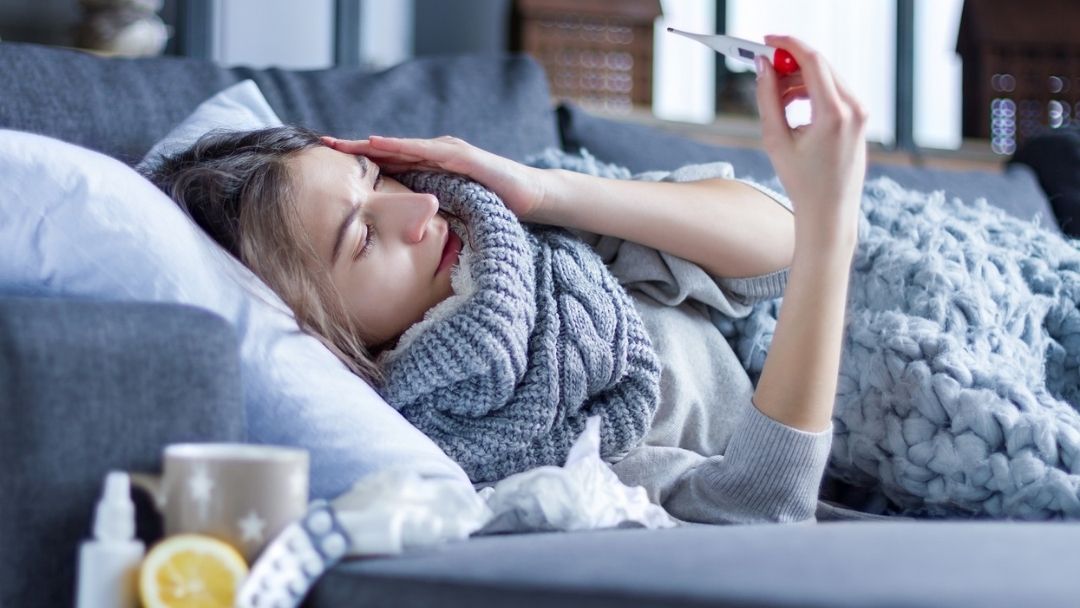Latest News
Self-care advice issued for thousands of Lanarkshire people self-isolating
Published: Friday, 07 January 2022

NHS Lanarkshire issues self care advice
With COVID cases and hospitalisations rising fast in Lanarkshire over the past week, NHS Lanarkshire today issued self-care advice for people sick at home with COVID or one of the other common winter illnesses.
Speaking about the advice issued today, Dr Linda Findlay, Medical Director, South Lanarkshire Health and Social Care Partnership, said how concerned they were about the rapidly rising COVID case numbers and increasing hospitalisations across the area:
“We’re seeing around 3000 daily positive COVID cases as the highly transmissible Omicron variant races across Lanarkshire and hospital admissions are rising, fast.
“The majority of people who have been double vaccinated or those who have already had their booster, will – we hope and expect – have a mild illness if they do catch COVID, a bit like a winter cold or bout of flu with many of the same symptoms.
“Most people can look after themselves perfectly well at home. Rest is important: many will need to spend a few days in bed. So too, is keeping windows open, for fresh air. Be strict about hand hygiene. Drink plenty of fluids but avoid tea, coffee and alcohol and eat simple food if you’re hungry.
“Take over the counter painkillers like Paracetamol or Ibuprofen for headaches and sore and aching limbs.”
Last winter, the levels of many common seasonal infections like flu, the common cold and the winter vomiting bug (norovirus), remained low even as the COVID-19 pandemic surged. Scientists believe that the measures we took then to fight the pandemic – such as limiting social interactions, physical distancing, mask wearing, hand washing and keeping windows open – had a huge impact on these other common illnesses.
But with everyone’s focus on the new COVID variant, it’s easy to forget how transmissible other common winter bugs are: once one person in a group becomes sick, everyone else tends to fall sick too.
So what can people do to prepare and how can they self-care at home, if they or their loved ones become sick?
Step 1: Know what you’re dealing with
There are some similarities and important differences between COVID and these seasonal illnesses that are worth taking note of.
The main symptoms of colds and flu are ones we’re all familiar with: sore throats, headache, temperature, runny nose, aching limbs and tiredness. However, these are now also reported as symptoms experienced by double and booster vaccinated people, who actually turn out to have COVID.
If you have these symptoms, you must get a PCR test (don’t rely on a home LFT) and self-isolate until you get the results.
The main symptoms of the winter vomiting bug (norovirus) can also include a high temperature, a headache, aching arms and legs alongside symptoms that are a little different: feeling sick (nausea), diarrhoea and actually being sick (vomiting). The symptoms start suddenly within 1 to 2 days of being infected.
Step 2: Take action to stop the spread
You can protect friends and family from falling ill by taking a lateral flow test every day or so; keeping rooms well ventilated; keeping 2 metres apart from other people not in your family or bubble and above all, washing hands well and often.
Anyone with ‘cold or flu like’ symptoms, must get a PCR test and self-isolate until the results are back.
Norovirus can spread very easily and is most often caught after close contact with someone who has the virus; by touching surfaces or objects that have the virus on them, then touching your mouth or sharing and eating food that’s been prepared by someone with norovirus.
Washing hands frequently with soap and water is the best way to stop it spreading. Alcohol hand gels do not kill norovirus.
Step 3: Self-care, at home
Most people will be able to treat themselves or a loved one at home for most winter infections and most people start to feel better in 2 to 3 days.
The best thing is to rest and drink lots of fluids (avoiding tea, coffee and alcohol) to prevent dehydration. If you’re vomiting or have diarrhoea, take oral rehydration salts. These can be easily bought, over the counter, at the pharmacy.
Keep these handy with your other ‘self-care at home’ medications such as paracetamol or Ibuprofen, useful for headaches, sore throats and aching limbs. Gargling with cool, boiled water with a pinch of salt, can help ease sore throats.
Check supplies of essential, prescription medication and make sure your household has some simple, first aid essentials such as antiseptic, burn plasters and wound dressings.
10 tips for self-care at home this winter if you get sick with a cold, flu, norovirus or COVID
- Stay at home and stay away from other members of the household, to limit the spread.
- Rest
- Wash your hands often and well with warm water and soap.
- Don’t prepare meals or share food, plates, mugs or cutlery with others in your household.
- Take Paracetamol or other over the counter painkillers for headaches, sore throats and sore and aching limbs.
- Keep windows open to ventilate rooms
- Drink plenty of fluids but avoid tea, coffee and alcohol. Water is best.
- Eat small, light, meals if you feel like it.
- If you are vomiting or have diarrhoea take oral rehydration salts. You can buy these at the pharmacy. If you have blood in your poo, seek medical help.
- If you’re worried about a baby under 12 months, or if you as an adult don’t get better after 7-10 days, or if you feel your symptoms are worsening at any point, call NHS 111.
NHS111 can deal with any urgent questions or concerns. There’s also more information on NHS Inform www.nhsinform.scot and advice at www.nhs.uk




